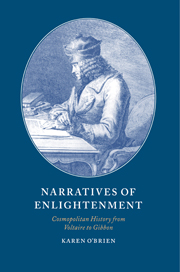Book contents
- Frontmatter
- Contents
- Acknowledgements and author's
- 1 Introduction: cosmopolitanism, narrative, history
- 2 Voltaire's neoclassical poetics of history
- 3 European contexts in Hume's History of England
- 4 William Robertson to the rescue of Scottish history
- 5 Robertson on the triumph of Europe and its empires
- 6 Emulation and revival: Gibbon's Decline and Fall of the Roman Empire
- 7 David Ramsay's sceptical history of the American Revolution
- Afterword
- Bibliography
- Index
- CAMBRIDGE STUDIES IN EIGHTEENTH-CENTURY ENGLISH LITERATURE AND THOUGHT
7 - David Ramsay's sceptical history of the American Revolution
Published online by Cambridge University Press: 28 October 2009
- Frontmatter
- Contents
- Acknowledgements and author's
- 1 Introduction: cosmopolitanism, narrative, history
- 2 Voltaire's neoclassical poetics of history
- 3 European contexts in Hume's History of England
- 4 William Robertson to the rescue of Scottish history
- 5 Robertson on the triumph of Europe and its empires
- 6 Emulation and revival: Gibbon's Decline and Fall of the Roman Empire
- 7 David Ramsay's sceptical history of the American Revolution
- Afterword
- Bibliography
- Index
- CAMBRIDGE STUDIES IN EIGHTEENTH-CENTURY ENGLISH LITERATURE AND THOUGHT
Summary
All the histories so far discussed seek, in various ways, to project a cosmopolitan cultural awareness as a correctirve to the political and religious habits of thought of their local readerships. This awareness often extends to the imperial edges of the eighteenth-century world, although, so far, only Robertson can be said to have given detailed consideration to synchronicities and disjunctures between European and colonial patterns of history. In the unpublished portion of his History of America, Robertson started to explore the ways in which British North American history, viewed as a process of steady anglicisation, might be assimilated to a historiographical model of European convergence and development. Although this particular work remained in manuscript until well after the American Revolutionary War, Robertson's project – the application of a narrative of European distinctiveness and civilisation to its colonial settlements – was echoed in a number of North American colonial histories as well as some early national historical writings in America. This chapter investigates the viability of Enlightenment forms of historical narrative for American writers addressing the colonial and revolutionary experience in their country. It focuses upon one of the first American historians of the American Revolution, David Ramsay, a Pennsylvanian writer of Scottish ancestry, although it also has something general to say about later eighteenth-century American historical writing. Ramsay was one of the few post-Revolutionary historians who tried to fit American history into the moulds made by Robertson, Hume and Voltaire.
- Type
- Chapter
- Information
- Narratives of EnlightenmentCosmopolitan History from Voltaire to Gibbon, pp. 204 - 233Publisher: Cambridge University PressPrint publication year: 1997

